'The model so far has been that there are only two leaders needed by the BJP and they live in Delhi. The rest serve faithfully at their sufferance.
'Yediyurappa has beaten that rule. He has declared himself a leader in his own right,' says Shekhar Gupta.
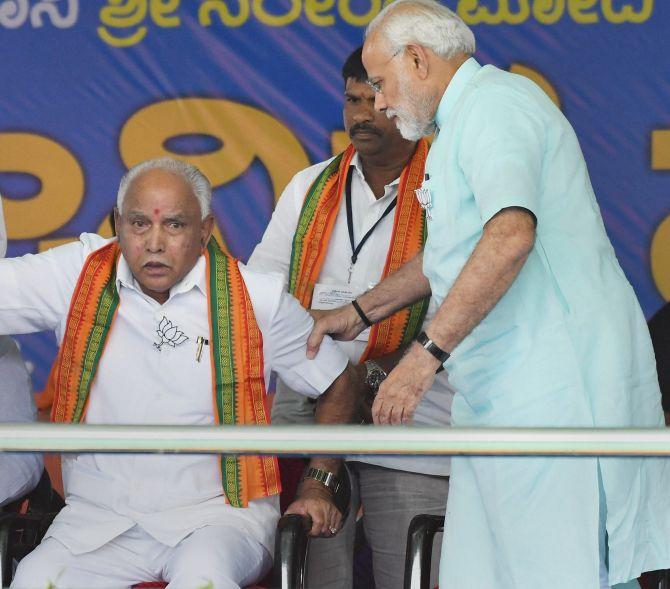
Karnataka isn’t politically the most important state in India. In terms of its contribution to the Lok Sabha, it is a mid-sized state -- in the Kerala (20) to Madhya Pradesh (29) ballpark. Yet, Karnataka has beaten any of these several times over in its domination of the headline space for the past many months.
Now, with the BJP in power again you’d expect a smug sense of victory and calm. Scratch the surface, you will see much disquiet and dissonance instead.
We can go so far as to say that mid-sized Karnataka has provided the first challenge to the unfettered, unquestioned authority of Amit Shah and Narendra Modi.
We should finesse it further. It isn’t Karnataka, but B S Yediyurappa who has brought that unlikely power coup in his own party.
For the first time, an individual has forced his high command to make compromises it wouldn’t make to any other in the party.
Defying the age limit of 75 years is only one of these.
Yediyurappa is 76, well past the age at which the party under Modi and Shah have insisted everybody go to a Raj Bhavan or to the Margdarshak Mandal.
As we run our eyes over the entire BJP star cast since 2014, probably only two leaders may have survived in a cabinet job beyond 75, and that too very briefly. The first, Najma Heptulla, ended up in the Raj Bhavan in Imphal and the second, Kalraj Mishra, has now landed in Shimla after a sizeable quarantine through which he dutifully tweeted praises for Mr Modi until the “call” came.
No other in the BJP, at least none of consequence, has been able to defy that age limit.
To the extent that even those BJP leaders who would otherwise demand Modi as India’s prime minister for life have found it safe to speculate on his likely successor once he crosses 75 in his “third term”.
That underlines the special power of Yediyurappa.
Of course, it might also mean that the notion of Modi retiring at 75 may also become obsolete. If the rule can be relaxed for a relatively minor state leader, why not for the much fitter and powerful Modi?
In so many ways, Yediyurappa is everything an ideal Modi-Shah chief minister isn’t. List the chief ministers of important states appointed by them since 2014.
None of these was the dominant leader in his state and a natural claimant, or even a front-runner for chief ministership. Not even Yogi Adityanath.
None of these was from a dominant caste in the state. Manohar Lal Khattar was a far-out Punjabi in Haryana where Jats ruled.
In Jharkhand, power was denied to the tribals.
In Maharashtra, the choice of a young and Brahmin Devendra Fadnavis was like a finger in the eye of the Marathas.
Even in Assam, the most powerful leader, Himanta Biswa Sarma, was made to work under a much less powerful Sarbananda Sonowal.
The model so far has been that there are only two leaders needed by the BJP and they live in Delhi. The rest serve faithfully at their sufferance.
Yediyurappa has beaten that rule. He has declared himself a leader in his own right.
Not only is he a dominant caste leader, he has been a chronic dissident and defier of his high command.
Denied power in the past, he forced the party to appoint his protege Sadananda Gowda in his place, and when he too was destabilised, he rebelled, left the BJP, formed his own regional party, and contested the 2013 assembly election against it. He won only six seats, but took away much of the Lingayat vote, reducing the BJP to a humiliating 40 in a house of 224.
He has also forced his party to break the other key principle it claims to live by: Zero tolerance for corruption.
In his first term, he lost power because of corruption allegations and an adverse Lokayukta report, spent some time in jail, and was exonerated later.
But because he was made to step down, nobody could live in peace and the BJP ended up having three chief ministers in the 2008-13 term of its rule.
This mess greatly contributed to a clear Congress win even in 2013. But not only was he taken back, but restored to his old position as a regional satrap, which is anathema to the Modi-Shah BJP.
For comparisons, think of Shankarsinh Vaghela in Gujarat, the tallest BJP leader and a diehard RSS man who quit to form his own party and become chief minister of Gujarat with Congress support. Could the BJP have ever handed the state back over to him?
Defying age, caste, corruption and the test of loyalty, Yediyurappa has also forced his party’s hand in pulling down the Congress-JD-S government and replacing it immediately with its own.
The BJP may not have minded giving the coalition a little more time to self-destruct, but we cannot say that for sure.
It is quite likely, however, that Modi and Shah may have preferred to let the state be under President’s rule for some time and install their government after mopping up the stragglers.
The haste with which they were forced to swear-in Mr Yediyurappa was uncharacteristic and ungainly.
Because, the “tamasha” isn’t over yet if the speaker takes his mission to disqualify all defectors to a logical conclusion, barring them from contesting in the term of this assembly and leaves everybody to wait as the courts take their time.
This game has not yet ended. At least not as neatly as this BJP prefers.
What is it that gives this grand old man (by the standards of today’s BJP) such power, and what does his victory mean for the BJP and national politics?
First of all, it shows that the BJP has failed to build a younger leadership in the state. That his key detractor, Ananth Kumar, died prematurely helped Yediyurappa.
But most importantly, the BJP realised that in Karnataka, they can’t swing the assembly purely on Modi’s strength.
It’s the only state yet where the BJP has faced the challenge of its own leader’s caste vote bank within its Hindu vote bank.
BJP leaders in other states will also note this.
If you look around, you do not see anybody in the other states in the same league as Yediyurappa.
Vasundhara Raje in Rajasthan must be seething seeing her loyalists cornered and detractors elevated.
Shivraj Singh Chouhan has not been given the leeway or the resources, at least not yet, to pull down Kamal Nath.
But there are leaders, we can be sure, especially in Maharashtra and Jharkhand and, why, even Yogi Adityanath who might take inspiration from the Karnataka exception.
Postscript: If you’ve noted the unfamiliar new spelling of “Yediyurappa”, it is just that he had changed it to Yeddyurappa during his bad days for reasons of numerology. But since it didn’t work, he has restored the original. I am not sure, though, that he has become any less superstitious than before.
By Special Arrangement with ThePrint

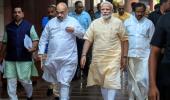
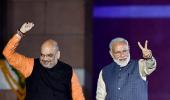
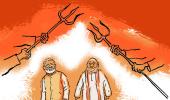
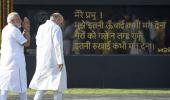







 © 2025
© 2025